Access the full transcript for this episode
“So what we do in Data Feminism is try to synthesize a whole lot of feminist ways of thinking about the world, that have to do with questions of bias and oppression, that have to do with questions of sort of unequal power, and who gets to make choices about how to design systems — with these sort of really broad social questions, we try to apply them to data science as both a field and as a practice.”
Join us as we engage in a conversation with Lauren F. Klein, Associate Professor at Emory University and Director of the Digital Humanities Lab. Klein shares her unique journey from a background in comparative literature to pioneering the field of digital humanities, where she bridges the gap between computational methods and humanistic inquiry. We delve into her innovative projects, including her influential "Data Feminism" book and the "Data by Design" project, exploring how these works challenge traditional data science perspectives and emphasize the importance of context, history, and ethics in data visualization.
“The point that I'm trying to make in this project is that if we take this historicized, almost literary and critical, humanistic lens to this history, we can see how the people who were designing data visualizations were either asking very similar questions to the kinds of questions about responsible data visualization that we're asking today, or they weren't. And because of that, we can see how their visualizations — far from being some sort of neutral representation of data — in fact, represented a certain policy sort of unreflective politics that I think we also need to be able to identify again, so that we don't reproduce that in the present.”












Share this post